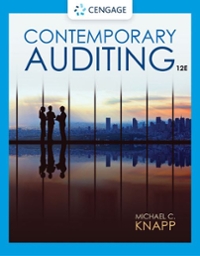The rapidly expanding Chinese economy has captured the attention of investors worldwide over the past two decades.
Question:
The rapidly expanding Chinese economy has captured the attention of investors worldwide over the past two decades. Companies such as Longtop sought to capitalize on the growing interest in the Chinese economy by listing their securities on international stock exchanges, including the leading exchanges in the United States.
In October 2007, Longtop went public with an initial public offering (IPO) managed by Goldman Sachs and Deutsche Bank. The company's common stock, which was listed on the New York Stock Exchange (NYSE), nearly doubled in price during its first day of trading. By late 2010, Longtop's stock had a total market value of $2.5 billion. Similar to the almost 200 other Chinese companies whose securities have traded on U.S. stock exchanges, Longtop became subject to the regulatory oversight of the Securities and Exchange Commission (SEC) when it listed its common stock on the NYSE.
In the late spring of 2011, Longtop was rocked by allegations that management had recorded bogus revenues to inflate the company's reported operating results and financial condition. Those allegations surfaced just as D & T Shanghai was nearing completion of its Longtop audit for the company's 2011 fiscal year, which ended March 31, 2011.
The source of the claims of fraudulent accounting was a small U.S.-based investment advisory firm that specializes in exposing companies that are "cooking their books." Among other allegations, that firm maintained that much, if not most, of the more than $400 million of cash reported in Longtop's preaudit 2011 financial statements-which accounted for almost 60 percent of the company's total assets-did not exist.
D & T Shanghai responded to the allegations of the investment advisory firm by extending its audit of Longtop's 2011 financial statements. In particular, the audit firm decided to revisit the audit procedures that had been applied to the company's cash accounts. In the past, the principal evidence the auditors had collected to corroborate Longtop's cash balances had been confirmations obtained from local branches of the company's banks.
On May 17, 2011, D & T Shanghai attempted to confirm Longtop's 2011 year-end cash balances by contacting the headquarters offices of the company's banks. Those extended cash confirmation tests were abruptly halted by Longtop officials, as reported by the New York Times.
Questions
1. What are the key conditions or circumstances that must be present for a company to be "auditable"? What uncommon challenges to "auditability" are posed by Chinese companies?
2. Do the major international accounting firms have a responsibility to ensure that their individual national practice units provide independent audit services that are uniform worldwide Defend your answer.
3. Acme, Inc., a multinational company based in the United States, has a large subsidiary located in Beijing, China. Acme is audited by an international accounting firm headquartered in the United States; its subsidiary is audited by the Chinese affiliate of that firm. Under U.S. auditing standards, what responsibilities, if any, does Acme's U.S. audit firm have to supervise or oversee the audit of the Chinese subsidiary?
4. What alternative strategies or approaches could U.S. regulatory agencies consider invoking to ensure that the audits of non-U.S. companies with securities traded on U.S. markets are adequate?
5. Since ethical and moral values vary from culture to culture and nation to nation, does this mean that a global profession, such as the accounting profession, cannot have a uniform ethical code?
Step by Step Answer:






